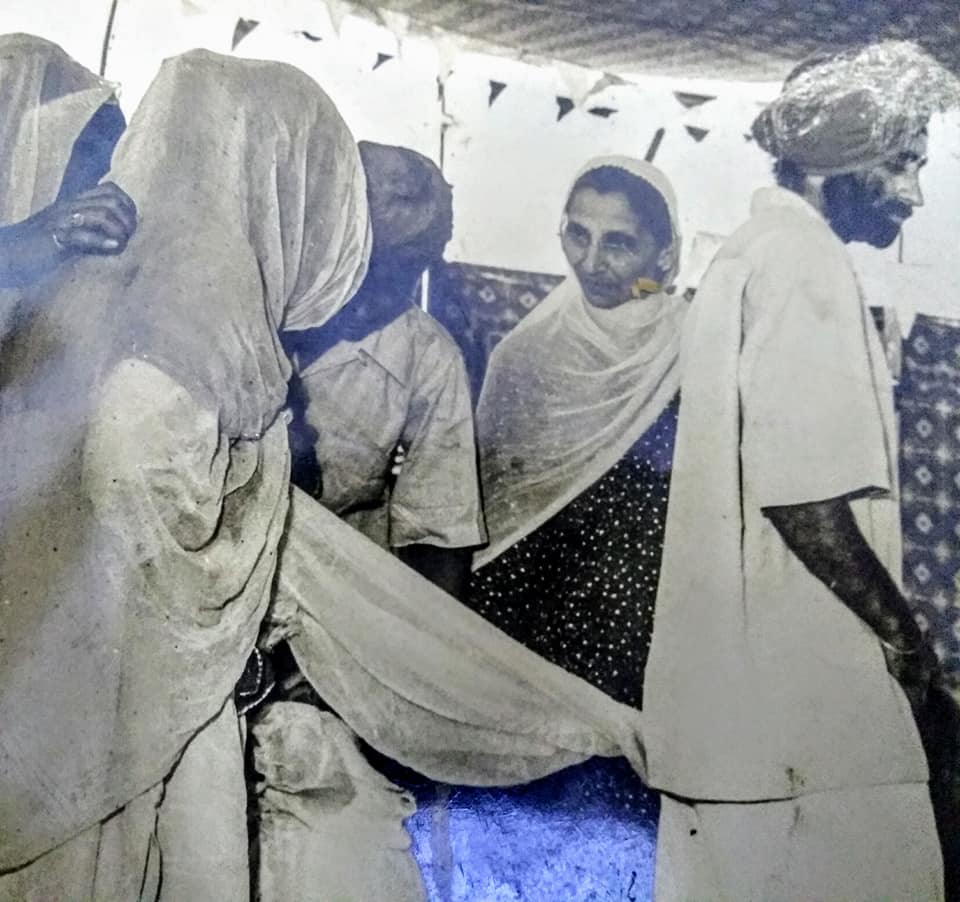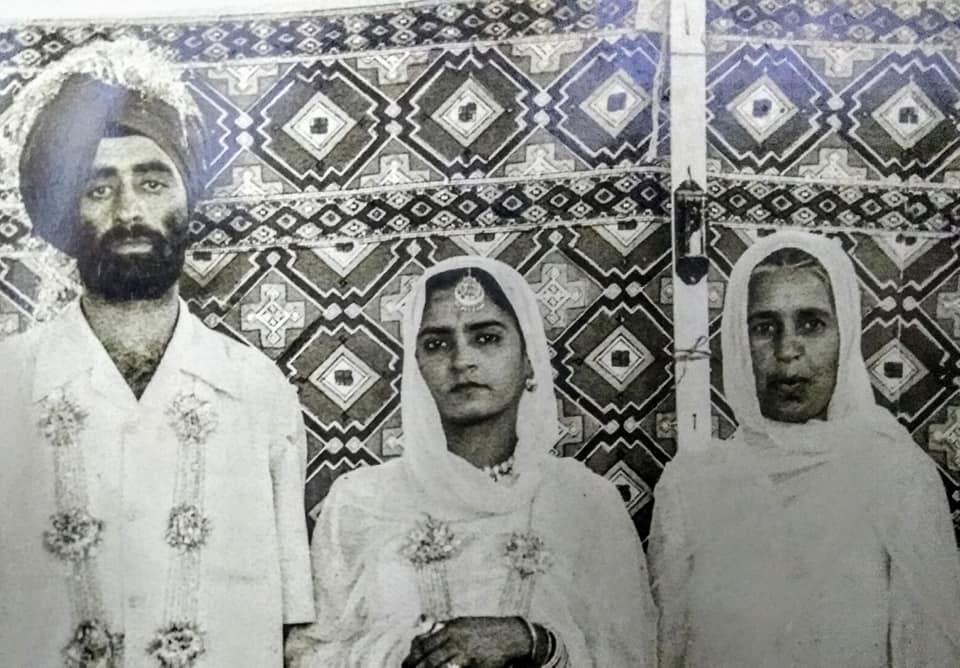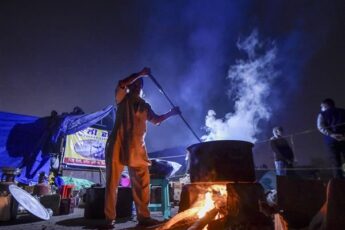The Tale of the Two Sardarni Raj Kaurs’
By Sarabjeet Dhody Natesan

I thought grandmothers were meant to be sad. Mine were. Despite having a name as majestic as Sardarni Raj Kaur, a name shared by both my grandmothers, as namesakes and like some soul mates, they were always sad. As a child, I thought it was normal for older people to be forlorn and didn’t give it much thought. I never saw them happy to know that there was a different side to them. I grew up next door to my father’s mother and spend a lot of my childhood at my mother’s childhood house at my nani’s. She lived barely 5 kms from us and every opportunity my mother could muster, she would take us there.
Sardarni Raj Kaur Mamak, my nani, my Beeji, was an ethereal beauty. Tall, slim, she had porcelain skin and by Indian standards was fair enough to be confused for a vilayati memsahib, an English lady. She was from Gujranwalan in Pakistan and my mother would often tell us how strangers would come to her childhood home just to see her. She was married with much pomp and gaiety to a police inspector from Lahore who swooned on her and kept her in the status he believed was befitting such a good looking woman. She gave birth to seven children: two daughters and five sons. Sardarni Raj Kaur Dhody, my dadi, my Bhaviji was short, smart, sturdy and a powerful looking woman. She was from Rawalpindi and gave birth to thirteen children out of which eleven survived.
I spent my childhood between them. School time with my one RajKaur, holidays with the other. Vacations, in those days, meant you went to your grandparents’ home, even if that meant next door or ten minutes away. But I was very envious of my father’s sister and her family in Mumbai, who came to Delhi every summer during the holidays. It never occurred to my parents to take us to Mumbai instead. During summer holidays, my task was primarily to run to the stores on my bicycle and get whatever was required for our guests. I had great utility value then too.
Our vacations turned out to be more about inventing adventure than living it. Staid, simple summer adventures, biking around the block, sometimes up to the railway lines, packing our lunch and having a picnic in the park outside the house. Monsoons brought rains and our leftover notebooks were promptly converted into sloppy paper boats. They floated unconfidently on the rainwater gutters, the penmanship gently smudging, before giving up and getting devoured by the ghouls in the underground sewers, who seemed forever hungry for paper boats. Winters meant eating moongfalli and gur while sunning ourselves in the afternoon sun and listening to the gossip of the entire block. The neighbourhood aunties, after finishing lunch, brought out their charpias and strategically moved them over the next hour or two, following the setting sun. Their knitting needles clicked furiously while stories of what was happening in other people’s lives came to life.
The only thing that remained unchanged and unmoved in my childhood was our weekly outing to Raj Kaur’s house ten minutes from our own, on Wednesdays and Sundays, to watch Chitrahaar and the staple Sunday Hindi movie on the only channel Doordarshan. Their television set was a point of envy in my neighbour Raj Kaur’s house.
My nani’s house was big and had an area for everything: a drawing room, a dining room, bedrooms, storeroom, first floor, balconies, terraces and even a room converted into a Gurudwara. Every morning and evening, Raj Kaur would do a Prakash, a required ritual of opening the Guru Granth Sahib and reading from it. Hers was a well to do family, who had moved from the Kingsway Way Refugee Camp to a really classy area of Delhi, Nizamuddin East. She was always dressed well, in beautiful salwar kameezes with lovely chiffon dupattas or in silk sarees; her attire was flawless. But my grandmother was sad. Even when she smiled, I never saw the sorrow leave her face. Until I became old enough to know the difference between happy and sad, to understand pain and loss, I tried everything to make this Raj Kaur happy. I stood on her window ledge singing songs, giving speeches, acting in imaginary dramas, but like the sad princess from the fairy tale, who never laughed, my grandmother too never laughed. Bit by bit, as I became physically conscious of the life in that big house, I was struck by the dim light, by the heavy curtains on the only road facing the single window on the ground floor, that too on the back street. The house was recessed from the street, and the moat of a verandah kept all conversations and all sounds and sights and sighs inside. And looking around, I saw, much to be sad about: one son, on a bed since 1949, paralysed from his neck down; another son, a victim of a train accident, which took away one limb, from the knee down; her husband, who had lost his hearing and memory and would go missing, wandering off. Her sadness was like a mountain; you could see it, feel it, touch it, and you could climb it as much as a couple of hours’ visit would allow. We did climb it, sense her misery, and at the appointed hour of our departure, let the stone roll back down the slope, only to it back upon our next visit. Only my mother seemed to carry pieces of Raj Kaur’s mountain back home with her.
As I grew up, it struck me, how earlier I’d never noticed my bedridden uncle, Bawa mama and his confined life. It was so natural to find him there, being helped to sit, eat, and exist. He read a lot, listened to the radio, watched the television diligently and wrote a lot of letters—well, made us write letters for him. All of us were supposed to read his mail to him, write his replies, and talk to him about our life. It kept him going. There was never any pity; we did nothing out of pity or duty. He was there and he asked us to do things and we did them. His bed was in the biggest room in the house, right opposite to the kitchen, next to the window.
About three feet away was his youngest brother’s bed. In a dormitory-like setting, next was my grandmother’s double bed. It was on this bed, next to her, that I would sleep, whenever I stayed overnight. This arrangement was so that if Bawa needed any help at night, there were people around to help him. My grandfather slept in the next room; he was old and not well enough to be of much use. Once I understood this, I also understood my mother’s frequent visits, her unspoken concern for her mother, her need to sit with her and share her grief and her anguish, just by being there.
My other Sardarni Raj Kaur, unlike her namesake, was not kept in luxury. The toll of 13 children, partition, and the unfortunate death of her husband left her in constant grief and in my mind, very apprehensive and worried about her position in life. I always found her in the kitchen, in an old salwar and a long undershirt with a pocket, where she kept her storeroom key. The storeroom had her almirah and we used to wonder what she had locked in there, but she never let us get in there. We had identical homes, mirroring each other. My father, her favourite and her lifeline, made sure that he was next door to her. He went to meet her twice every day, before he left for work and after he returned. She knew of her Krishan’s devotion to her, and she gloated about it no end. My father would get very upset at her attire, and brought her new clothes often. She would take his gift, and still wear old clothes. Wickedly, I imagined her locking it all in her almirah in her storeroom. Her life required her to maintain a certain balance, so she played games, alternating between being miserable, sad, and forced cheerfulness.
The two Raj Kaurs did not get along at all. A forced smile, a cold SatSriAkal, was all that they shared. They resented each other, trying to tilt the barometer of misery in their own direction. Raj Mamak held the other Raj responsible for the conflict in her daughter’s life, for Raj Dhody thought that her son had married beneath him and never let my mother forget that. Unsurprisingly and sadly, my mother born to a magnificent beauty was considered rather plain, even though she resembled her mother, because she had her father’s darker skin. And peculiarly, my father born to a swarthy mother was fair, golden-haired, and had blue eyes at birth. The fact that his was an arranged match which Raj Kaur, my neighbor, had herself solemnized, did not stop her from picking on my mother. Then, when three daughters were born to her Krishan my father, she would alternate between despair for him and taunts for my mother.
The other Raj Kaur, however, loved my father. He visited her regularly and helped in taking care of the three young boys in her house. My father made them laugh and brought cheer to the gloomy house; he often brought gifts for them, however small or insignificant. My mother too transformed into a different person on such visits. We went in the evenings and returned late night, often to find my next door Raj’s light still on, waiting for us to return, keeping a tab on our time.
However, difficult her relationship was with my mother and however much she was disappointed in having three granddaughters to constantly remind her of a lack of son for her Krishan, Raj Kaur, my neigbour, was infinitely good to me. If my mother got delayed at work, she would make sure that I sat with her. If my mother had to leave for work early and my father had to get us ready for school, she would plait my very long hair; she would comfort me if I was unwell, sending a bowl of her food over, whatever she made. She had a small kitchen with her angeethi (traditional brazier for cooking) arranged on the floor, where she was forever cooking for her two sons, who lived with her, and for whoever chose to visit her. I remember very vividly being in her kitchen, squatting and watching her cook and listening to her speak about her departed husband, Bauji. She was a different person with me and I used to wonder about her unkindness to my mother.
But Raj Kaur was equally unkind to someone else too. Our two homes shared a terrace, and right in the middle of which was a small room; in that room, lived my father’s grandparents, Daarji and Baeji. They were really old people; they had looked old for as long as I remember. For a long time, I did not know who they were and what they were doing there. They were people who lived upstairs and generally kept to themselves. It was assumed that since my mother woke up earlier than the rest to get ready for work, she would make tea and breakfast for them and lunch would come from my grandmother’s kitchen and evening tea and dinner will be prepared by my mother. Early mornings around 4.30am, my mother would wake up and first set the water to boil and make two very large glasses of tea for them, take a box of rusks and gingerly climb the steps, balancing hot tea on a tray and serve. Before leaving for work, she would make four paranthas and send them up with my father or one of us.
Raj Kaur, their daughter-in-law, would send their lunch up with whosoever was around, so either my mother or I would take their dinner up to them. And later, after closing the kitchen, my mother went up to give them a glass of milk and bring the dirty dishes down. The two old people saw my mother first thing in the morning and went to bed after she shut their door at night. They would wait for her to come home and bring the evening tea and speak to them for a few minutes. She cared for them deeply and cooked special soft vegetables and softer chappaties for them, for they had no teeth. Their affection for my mother irked their daughter-in-law, Raj Kaur no end and many times I would find her muttering, who does she think she is? I assumed that the ‘she’ in question was my mother, but I never carried tales back to my mother, for I knew she would feel very bad hearing about it. Raj Kaur knowing that I carried no tales, would say things that upset me so much that I would not return to her kitchen for days.
But those interactions also gave me some time to understand her loneliness and fear. She had no independent income and had to depend on her sons for survival. All her children took care of her. I saw my uncles and aunts coming very regularly to meet her and give her money. My father helped pay off her house and educated his siblings and arranged their marriages. But the fear of isolation did not leave her; she was always worried as to how she will manage in her old age. Seeing the old couple brought out her fears more sharply. At least they are together, she thought. But how will I manage to live alone? Who will take care of me? On a really cold early winter morning, my mother took the two glasses of tea up and when she tried to wake up the two, only one woke up. Daarji had passed on at night and Baeji was left alone. And that made Raj very solemn, she was not upset at the passing of her husband’s father, she was worried about herself. She would tell me that unlike her, my mother’s Raj Kaur was in good shape and had all her sons around her. I would try to remind her that my father was there with her, but she would cut me off and go back to her despondency.
In the end, both Raj Kaurs, lived long and healthy lives, their happiness marred by their unwillingness to look beyond their deep sadness. I cried when they went, for both had made me understand love and life and how life is a sum of all its parts.





